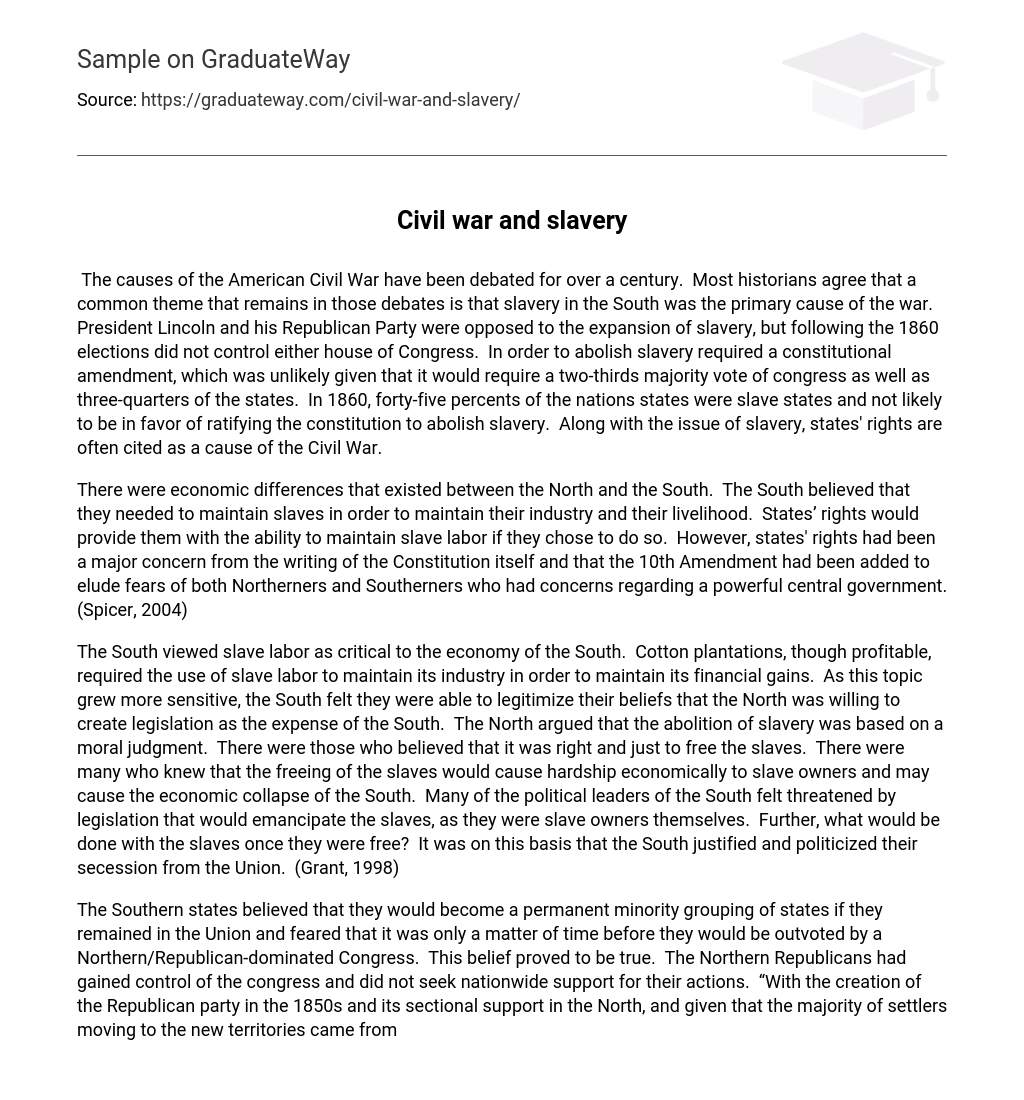The causes of the American Civil War have been debated for over a century. Most historians agree that a common theme that remains in those debates is that slavery in the South was the primary cause of the war. President Lincoln and his Republican Party were opposed to the expansion of slavery, but following the 1860 elections did not control either house of Congress. In order to abolish slavery required a constitutional amendment, which was unlikely given that it would require a two-thirds majority vote of congress as well as three-quarters of the states. In 1860, forty-five percents of the nations states were slave states and not likely to be in favor of ratifying the constitution to abolish slavery. Along with the issue of slavery, states’ rights are often cited as a cause of the Civil War.
There were economic differences that existed between the North and the South. The South believed that they needed to maintain slaves in order to maintain their industry and their livelihood. States’ rights would provide them with the ability to maintain slave labor if they chose to do so. However, states’ rights had been a major concern from the writing of the Constitution itself and that the 10th Amendment had been added to elude fears of both Northerners and Southerners who had concerns regarding a powerful central government. (Spicer, 2004)
The South viewed slave labor as critical to the economy of the South. Cotton plantations, though profitable, required the use of slave labor to maintain its industry in order to maintain its financial gains. As this topic grew more sensitive, the South felt they were able to legitimize their beliefs that the North was willing to create legislation as the expense of the South. The North argued that the abolition of slavery was based on a moral judgment. There were those who believed that it was right and just to free the slaves. There were many who knew that the freeing of the slaves would cause hardship economically to slave owners and may cause the economic collapse of the South. Many of the political leaders of the South felt threatened by legislation that would emancipate the slaves, as they were slave owners themselves. Further, what would be done with the slaves once they were free? It was on this basis that the South justified and politicized their secession from the Union. (Grant, 1998)
The Southern states believed that they would become a permanent minority grouping of states if they remained in the Union and feared that it was only a matter of time before they would be outvoted by a Northern/Republican-dominated Congress. This belief proved to be true. The Northern Republicans had gained control of the congress and did not seek nationwide support for their actions. “With the creation of the Republican party in the 1850s and its sectional support in the North, and given that the majority of settlers moving to the new territories came from the North, there was very little prospect that new slave states would be added to the Union in the years to come.” (Spicer, 2004) Although Lincoln had promised not to interfere with slavery, he broke that promise and led the South to believe that those in control, the Northerners, would use Congress for the support of their own interest. (Boritt, 1996)
Slavery was certainly the driving force behind the South’s secession from the Union. As the cause of the war, it could and would be redefined as economic disparity, states’ rights, and sectional politicians, it still returns to the issue of slavery. (Grant, 2000) Slavery was the basis for all of these concerns. “The main economic difference between North and South was slave labor, the key state right for most Southerners was the legality of slavery, and where conspiracists and agitators stirred up emotions they did so over the issue of slavery.” (Spicer, 2004) Slavery was the issue which began this conflict, but not because of slavery in and of itself, but rather what slavery represented to the South. Slavery was a resource that represented economic prosperity to the South. The attempt of the North to take that away constituted an action that limited the rights of the South, rights granted in the constitution of these United States. Economic prosperity results in power and control. The North’s attempt to abolish slavery meant that they would remain in control and the South feared they would continue to limit their rights. Today that same battle could occur over any issue that had similar results, land rights, resources, etc. In conclusion, the Civil War began as a conflict over slavery based on what slavery represented in terms of economic prosperity, power and control, and states’ rights.
References
Grant, S. (1998, September). Pride and Prejudice in the American Civil War. History Today, 48, 41+. Retrieved January 28, 2007, from Questia database: http://www.questia.com/PM.qst?a=o&d=5001367696
Grant, S. (2000, July). For God & Country Why Men Joined Up for the Us Civil War. History Today, 50, 20. Retrieved January 28, 2007, from Questia database: http://www.questia.com/PM.qst?a=o&d=5001057005
(1996). Why the Civil War Came (G. S. Boritt, Ed.). New York: Oxford University Press. Retrieved January 28, 2007, from Questia database: http://www.questia.com/PM.qst?a=o&d=78779045
Spicer, J. (2004). ‘The Cause’ of the American Civil War: John Spicer Judges That Slavery Was the Key Factor in Producing the Conflict. History Review, (49), 45+. Retrieved January 28, 2007, from Questia database: http://www.questia.com/PM.qst?a=o&d=5008837596





